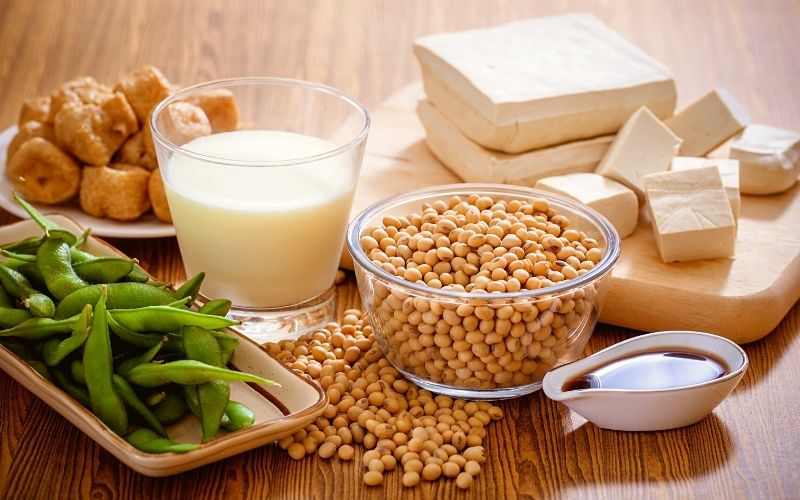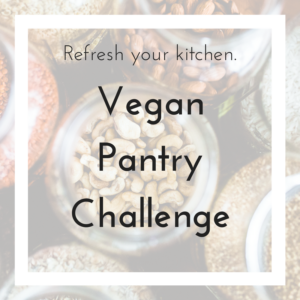When a client says “I am concerned about including soy products in my plant-based diet because of the cancer risk,” this is the information I can provide them.
In short: no, you should not avoid eating soy for fear of increasing your cancer risk. Quite the opposite!
In the past, many health professionals were concerned about the potential of the “plant estrogens” (isoflavones) present in soy to increase the risk of breast cancer (Collins, 2019). Studies done on rats also mislead us into thinking that soy consumption in humans would induce tumor growth. Thankfully, we now know that isoflavones interact with human estrogen receptors in different ways than actual human estrogen, and that rodents and humans process soy isoflavones differently.
We also know that regularly consuming soy products like edamame, tofu, and soy milk is NOT associated with a greater cancer risk. In fact, soy likely contributes to the prevention of various cancers and reduces the odds of recurrence.
Soy and breast cancer
The impact of soy consumption on the incidence of breast cancer has been one of the most studied. In their systematic review and meta-analysis of 75 prospective studies examining the connection between various foods and breast cancer risk, Kazemi and colleagues (2021) identified seven studies with data on soy consumption for 4,055 breast cancer cases. The authors state that “soybean consumption was associated with a 3.5% reduction in breast cancer risk.” They note that this finding is consistent with those of other related studies, however the number of studies they worked with remains small and did not allow to differentiate between types of soy or women’s life stages (pre- or post-menopausal).
Specific soy foods have also been studied. In a 2020 study by Fraser and colleagues based on the Adventist Health Study 2 cohort (52,795 females aged 30 and older), the health outcomes of women were contrasted based on their dairy or soy milk consumption. The benefit of the AHS-2 cohort is that it includes a critical mass of participants who do not consume dairy at all, as well as many who consume more soy foods than the average American. They were able to individually control for soy or dairy consumption. The study found no clear association between soy milk and breast cancer, but a higher risk of breast cancer in participants consuming the most dairy milk compared to those consuming the least. One downside of this study is that milk consumption was only measured once at baseline, and participants may have changed their diet through the years. For those reasons, the authors note that the causality between dairy milk consumption and breast cancer needs to be considered but cannot be proven by their study alone.
Soy and other cancers
Soy consumption also decreases the risk of prostate cancer, based on a systematic review and meta-analysis of 30 studies totaling over 250,000 individuals from Asia, North America, and Europe by Applegate and colleagues (2018). Among other findings, the authors calculated a 35 percent reduction of the risk of prostate cancer in those consuming more unfermented soy foods. However, the authors note that not all studies included in their meta-analysis took all confounding factors into consideration, and that some of the studies’ data could be inconsistent due to deficient participant recall.
Eating non-fermented soy products may also decrease your risk of gastric cancer, though fermented soy products (like tempeh) were found to be associated with a higher risk (Wang, 2021).
Dietary guidelines
Thus, and though every study listed above has some limitations, there seems to be a consistent conclusion in the scientific literature: normal dietary consumption of soy food products, especially non-fermented ones like edamame, tofu, and soy milk, does not increase the risk of cancers occurring. Accordingly, the 2020 “Diet and Physical Activity Guideline” from the American Cancer Society encourages soy food consumption, as “soy and foods derived from soy are an excellent source of protein and thus provide a healthier alternative to meat.” The ACS however recommends avoiding soy-based supplements as they may be associated with higher cancer risk for certain women.
What about soy allergy?
You should know however that soy is considered a priority allergen (Health Canada, 2018). If you consume soy products (soy milk, tofu, edamame, vegan meats made with soy protein) and start experiencing a skin reaction, tingling (especially near your mouth), abdominal symptoms, or signs of anaphylaxis, you should get medical attention. However, an expert committee from the Food and Agriculture Organization of the United Nations is recommending that soy be moved to the “B list” of allergens as it impacts a very small number of people globally and generally causes mild symptoms only (FAO and WHO, 2022). Aside from being very nutritious, soy can be made into many delicious dishes and seasoned in a myriad of ways, so we would be foolish to go without.
Plan to enjoy some soy foods every week!
Because it’s so nutritious, delicious, and easy to prepare, I make sure to include some tofu or other soy products, especially edamame, in the Vegan Meal Plans every week. Enjoy!



